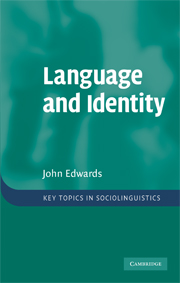Book contents
- Frontmatter
- Contents
- 1 Introduction
- 2 Identity, the individual and the group
- 3 Identifying ourselves
- 4 Language, dialect and identity
- 5 Dialect and identity: beyond standard and nonstandard
- 6 Language, religion and identity
- 7 Language, gender and identity
- 8 Ethnicity and nationalism
- 9 Assessments of nationalism
- 10 Language and nationalism
- 11 Language planning and language ecology
- Glossary
- Notes
- References
- Index
- References
6 - Language, religion and identity
Published online by Cambridge University Press: 05 June 2012
- Frontmatter
- Contents
- 1 Introduction
- 2 Identity, the individual and the group
- 3 Identifying ourselves
- 4 Language, dialect and identity
- 5 Dialect and identity: beyond standard and nonstandard
- 6 Language, religion and identity
- 7 Language, gender and identity
- 8 Ethnicity and nationalism
- 9 Assessments of nationalism
- 10 Language and nationalism
- 11 Language planning and language ecology
- Glossary
- Notes
- References
- Index
- References
Summary
INTRODUCTION
There are lots of possible choices for the source of the greatest evil and misery, but many have singled out religion. The late Milton Himmelfarb, however, thought that this was but ‘a feeble joke’. He cited ethnonational affiliations, racial and class differences, and linguistic and ideological compartmentalisation for persecution, hatred and conflict. Or, indeed, ‘simple bloody-mindedness’ (see Berger, 2007). The last seems rather weak in the company of those other, more powerful motivations, but if we consider the historical propensity that human beings have shown for letting small matters spiral into large ones, or the dynamic potential of Freud's ‘narcissism of minor differences’, or the dubious contributions made over the centuries by conceptions of ‘honour’, then perhaps we should acknowledge Himmelfarb's point.
Still, ethnocentrism and relativism have always had religious counterparts. The holy books of most religions emphasise love, tolerance, justice, truth, and just about every other positive human characteristic. It is disappointing, then, that the history of religion contains so many dark and unpleasant chapters – disappointing but not very surprising, perhaps, given the strain of outfitting other-worldly ideals in mundane clothing. This is in fact the argument usually made when religious practices are criticised and seen to fall short of divine writ: the ideas are pure and good but, alas, they are interpreted on earth by misguided, or narrow, or evil, or corrupt officers.
- Type
- Chapter
- Information
- Language and IdentityAn introduction, pp. 99 - 125Publisher: Cambridge University PressPrint publication year: 2009



